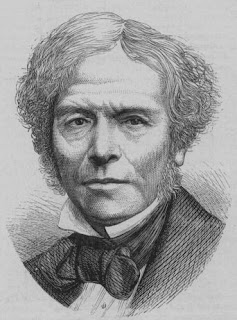 |
| Michael Faraday |
Michael Faraday was born in 1791 in Newington, England. Originating in the family dispossessed and generally learn on their own. At the age of fourteen he was an apprentice carpenter so volumes and selling books, and he used this opportunity many people read books like crazy.
When he turned twenty-year-old, he visited the lectures given by renowned British scientist Sir Humphry Davy. Faraday was fascinated and gaped open. Davy wrote to lady luck and a short story accepted as his assistant.
Within a few years, Faraday was able to make new discoveries on his own creation. Although he did not have adequate background in mathematics, as a natural scientist he was unchallenged.
Faraday first important discovery in the field of electricity occurred in 1821. Oersted two years earlier had found that the magnetic compass needle usually can be moved if an electric current flowed in the wire are not far apart. These make Faraday concluded, if the magnet diketatkan, which moves precisely wire.
Work on the basis of this allegation, he managed to make a clear scheme where the wire will spin continuous contact with the magnet along the electrical power is applied to the wire. Indeed in this case Faraday had discovered the first electric motor, a first scheme using electrical current to make something moving objects. No matter how primitive, is the discovery of Faraday's "ancestor" of all electric motors are used today's world.
This is an incredible trailblazer. However, its practical usefulness is limited avail, as long as there is no method to move the electric current from the battery than simple chemical at the time.
Faraday believes, there should be a way of using the magnet to move the power, and he's constantly looking for a way how to find the method. Now, the magnet is not moving does not affect the electric current which is adjacent to the wire. But in 1831, Faraday discovered that when the magnet passed through a wire, current will flow in the wire while the magnet moves. This situation is called "electro-magnetic influence," and this discovery is called "Faraday's Law" and is generally considered the most important invention of Faraday and greatest.
This is a monumental discovery, for two reasons. First, "Faraday's Law" has a fundamental significance in relation to our theoretical understanding of electro-magnetic.
Second, the electro-magnetic can be used to drive continuous flow of electric current as demonstrated by the Faraday by making the first electric dynamo. Although our power generators to supply the cities and factories today are much more perfect than what was done Faraday, but all based on similar principles to the electro magnetic influence.
Faraday also contributed in the field of chemistry. He made a plan change so the liquid gas, he found various types of chemicals including benzene. More importantly, the work of his efforts in the field of electro-chemistry (chemical investigation of the effect of electric current).
Faraday with high precision investigation resulted in two laws "elektrolysis" that mention his name coupled with the basic principles of electro chemistry. He also popularized the term used a lot in that field such as: anode, cathode, electrode and ion.
Faraday and was introduced to the world likewise an important idea about the physics of magnetic lines and electric power lines. With the emphasis that is not its own magnetic field but in between, he helped prepare the way for various kinds of advances in modern physics, including Maxwell's statement about the similarities between the two expressions by sign (=) such as 2x + 5 = 10.
Faraday also discovered, when a combination of two light passed through a magnetic field, something in between will be amended. This invention has particular significance, because this is the first clue that there is a relationship between the light with magnet.
Faraday was not only intelligent but also beautiful and have style as a speaker. But, he is simple, do not take the matter in terms of fame, money and adulation. He refused to be knighted and also refused to become chairman of the British Royal Society. Live long and happy marriage, just do not have children. He died in 1867 near the city of London.










